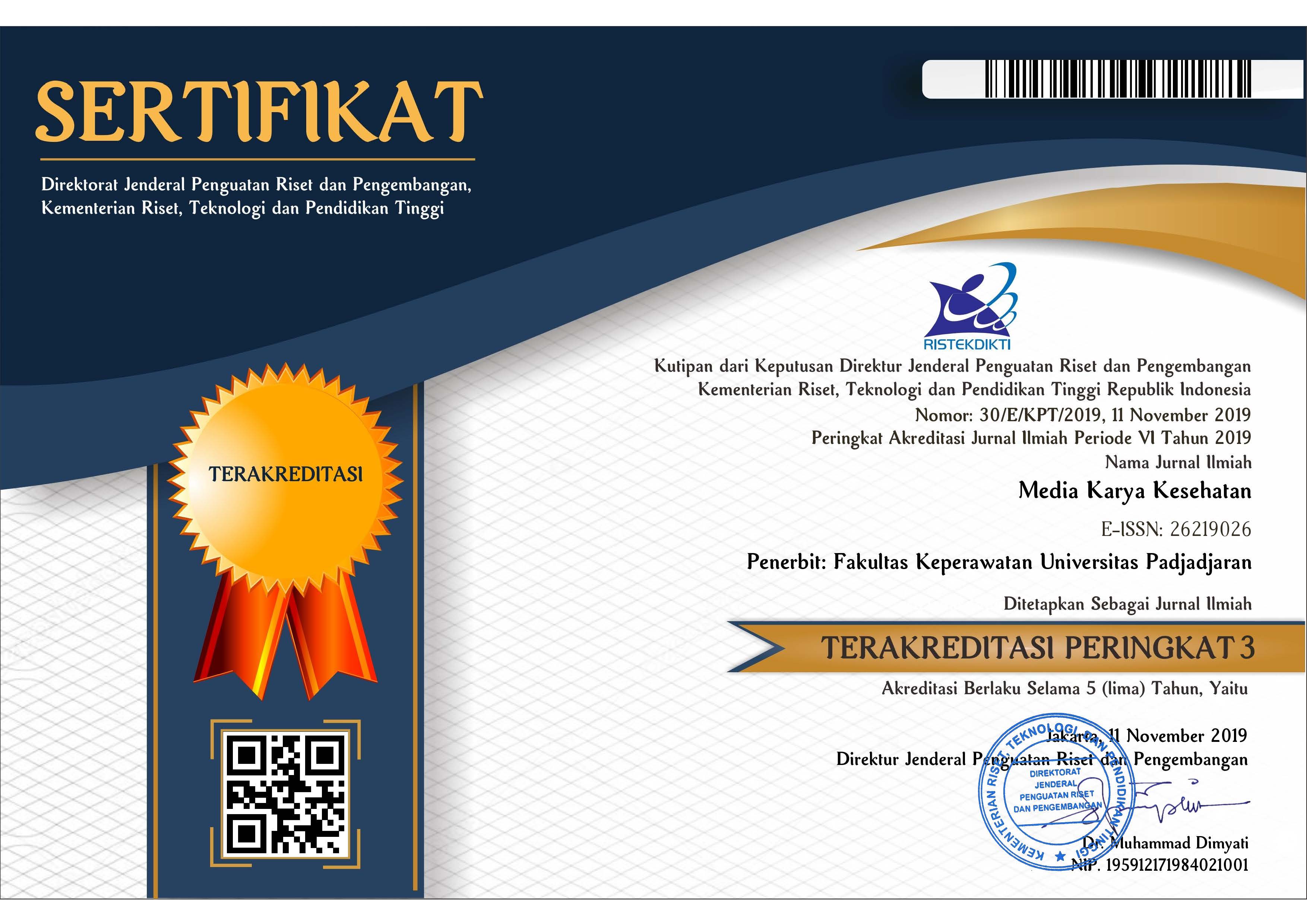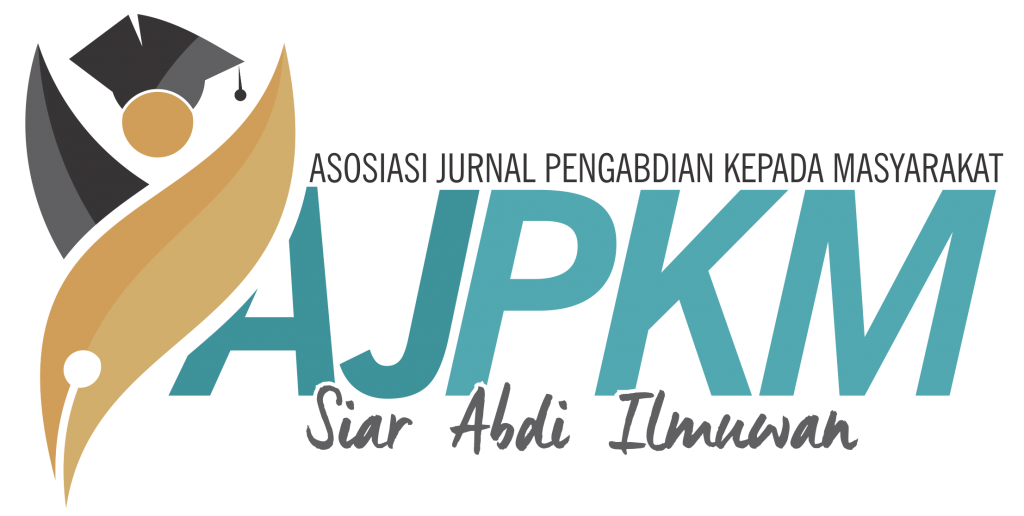Enhancement of Trusting Relationship with Motive-Oriented Therapeutic Relationship (MOTR) Approach in Schizophrenia Patients: A Case Report
Abstract
Building a trusting relationship is the initiation process of the therapeutic communication between nurses and patients. In patients with schizophrenia, Building a trusting relationship is a challenge that is not easy and is often overlooked. If they have no strategies, internal and external factors of both nurses and patients may complicate them in building a therapeutic relationship. One of the techniques of interaction that can be practiced by nurses is Motive-Oriented Therapeutic Relationship. This study uses a case report of one patient with schizophrenia who has auditory hallucination disorder. Interactions were conducted on April 04 - 11, 2023. The intervention used the Motive-Oriented Therapeutic Relationship approach, and the assessment of the trust response used an adaptation of the General Trust Scale instrument. There was a positive response to the patient's trust in the nurse after the Motive-Oriented Therapeutic Relationship experience for 3 days, this was evident from the increase in the average value of the patient's General Trust Scale score from 0.20 to 0.86 whereas the patient was said to have trust if (α =>0.83). Intervention of Motive-Oriented Therapeutic Relationship approach can build BHSP in patients with Schizophrenia and as recommendation it should be carried out together with Plan Analysis (PA) so that the therapeutic relationship is established for optimum psychiatric care.
Keywords: Schizophrenia, BHSP, MOTR, GTS.
Full Text:
PDFReferences
Barreto Carvalho, C., Da Motta, C., Pinto-Gouveia, J., & Peixoto, E. B. (2015). Hallucinatory Activity in Schizophrenia: the Relationship with Childhood Memories, Submissive Behaviour, Social Comparison and Depression. International Journal of Psychological and Behavioral Sciences, 9(5), 435–443. http://www.waset.org/publications/10001605
Caspar, F. (2019). Plan Analysis and the Motive-Oriented Therapeutic Relationship. In Case Formulation for Personality Disorders: Tailoring Psychotherapy to the Individual Client. Elsevier Inc. https://doi.org/10.1016/B978-0-12-813521-1.00014-X
Christine, H., Laura M, T., Sara C, V., Melissa, F., Christine, H., & Sophia, V. (2012). Can I Trust You? Negative Affective Priming Influences Social Judgments in Schizophrenia. Cancer Prev Res, 6(5), 477–482. https://doi.org/10.1037/a0020630.Can
Davlantes, E., & Abraham, S. P. (2021). Advantages and Challenges of Developing a Trusting Relationship with Individuals Who Have Schizophrenia. Human Journals Review Article, August, 1. www.ijsrm.humanjournals.com
Gaebel, W., & Zielasek, J. (2015). Focus on Psychosis. Dialogues in Clinical Neuroscience, 17(1), 9–18. https://doi.org/10.31887/dcns.2015.17.1/wgaebel
Gilany, A. (2018). What is Case Report? Abdel-Hady, El-Gilany, 1(1), 10–15. file:///C:/Users/Lenovox220/Downloads/Whatiscasereport.pdf
Guedes de Pinho, L. M. (2017). Nursing Interventions in Schizophrenia: The Importance of Therapeutic Relationship. Nursing & Care Open Access Journal, 3(6). https://doi.org/10.15406/ncoaj.2017.03.00090
Hugdahl, K., Løberg, E. M., Specht, K., Steen, V. M., van Wageningen, H., & Jørgensen, H. A. (2008). Auditory Hallucinations in Schizophrenia: The Role of Cognitive, Brain Structural and Genetic Disturbances in the Left Temporal Lobe. Frontiers in Human Neuroscience, 1(MAR), 1–10. https://doi.org/10.3389/neuro.09.006.2007
Jasielska, D., Rogoza, R., Zajenkowska, A., & Russa, M. B. (2021). General trust scale: Validation in cross-cultural settings. Current Psychology, 40(10), 5019–5029. https://doi.org/10.1007/s12144-019-00435-2
Kramer, U., Kolly, S., Berthoud, L., Keller, S., Preisig, M., Caspar, F., Berger, T., De Roten, Y., Marquet, P., & Despland, J. N. (2014). Effects of Motive-Oriented Therapeutic Relationship in a Ten-Session General Psychiatric Treatment of Borderline Personality Disorder: A Randomized Controlled Trial. Psychotherapy and Psychosomatics, 83(3), 176–186. https://doi.org/10.1159/000358528
Kramer, U., Rosciano, A., Pavlovic, M., Berthoud, L., Despland, J. N., De Roten, Y., & Caspar, F. (2011). Motive-Oriented Therapeutic Relationship in Brief Psychodynamic Intervention for Patients with Depression and Personality Disorders. Journal of Clinical Psychology, 67(10), 1017–1027. https://doi.org/10.1002/jclp.20806
Lim, A., Hoek, H. W., Deen, M. L., Blom, J. D., Bruggeman, R., Cahn, W., de Haan, L., Kahn, R. S., Meijer, C. J., Myin-Germeys, I., van Os, J., & Wiersma, D. (2016). Prevalence and Classification of Hallucinations in Multiple Sensory Modalities in Schizophrenia Spectrum Disorders. Schizophrenia Research, 176(2–3), 493–499. https://doi.org/10.1016/j.schres.2016.06.010
Mucci, A., Kawohl, W., Maria, C., & Wooller, A. (2020). Treating Schizophrenia: Open Conversations and Stronger Relationships Through Psychoeducation and Shared Decision-Making. Frontiers in Psychiatry, 11(August), 1–8. https://doi.org/10.3389/fpsyt.2020.00761
Parnas, J., Yttri, J. E., & Urfer-Parnas, A. (2023). Phenomenology of auditory verbal hallucination in schizophrenia: An erroneous perception or something else? Schizophrenia Research, October 2022. https://doi.org/10.1016/j.schres.2023.03.045
Rheu, M., Shin, J. Y., Peng, W., & Huh-Yoo, J. (2021). Systematic Review: Trust-Building Factors and Implications for Conversational Agent Design. International Journal of Human-Computer Interaction, 37(1), 81–96. https://doi.org/10.1080/10447318.2020.1807710
Robbins, B. G. (2023). Valid and Reliable Measures of Generalized Trust: Evidence from a Nationally Representative Survey and Behavioral Experiment. Socius, 9. https://doi.org/10.1177/23780231231192841
Saho, A. M., Sulisna, M., & Wuryanto, E. (2011). Kepercayaan Pasien Kepada Perawat dalam Menjalankan Perawatan dengan Tingkat Kecemasan Pasien di Bangsal Kelas 3 Rumah Sakit Umum Daerah Kota Semarang. Journal of Chemical Information and Modeling, 4(1), 30–46.
Sameh, A. E. E., & Hafez, E.-A. M. (2017). The Clinical Characteristics of Auditory Hallucinations Among Schizophrenic Inpatients. Egyptian Journal of Health Care, 8(4), 334–347. https://doi.org/10.21608/ejhc.2017.211187
Schlier, B., Winkler, K., Jaya, E. S., & Lincoln, T. M. (2018). Fluctuations in Hallucination Spectrum Experiences Co-vary with Social Defeat but not with Social Deafferentation. A 3-Week Daily Assessment Study. Cognitive Therapy and Research, 42(1), 92–102. https://doi.org/10.1007/s10608-017-9871-8
Senn, J. F. (2013). Peplau’s Theory of Interpersonal Relations: Application in Emergency and Rural Nursing. Nursing Science Quarterly, 26(1), 31–35. https://doi.org/10.1177/0894318412466744
Sutherland, C. A. M., Rhodes, G., 1 Williams, N., Connaughton, E., 3 Ewing, Caruana, N., & Langdon. (2017). Appearance-Based Trust Processing in Schizophrenia. 1–14.
Wahyuningsih, S., Dida, S., Suminar, J. R., & Setianti, Y. (2019). Hambatan komunikasi terapeutik psikiater, perawat, kader jiwa, dan keluarga pada pasien gangguan jiwa pasca pasung. Jurnal Keperawatan Jiwa, 7(2), 115. https://doi.org/10.26714/jkj.7.2.2019.115-126
Wenzel, A. (2017). Schizophrenia. National Institute Od Mental Health. https://doi.org/10.4135/9781483365817.n886
Westermann, S., Cavelti, M., Heibach, E., & Caspar, F. (2015). Motive-Oriented Therapeutic Relationship Building for Patients Diagnosed with Schizophrenia. Frontiers in Psychology, 6(September), 1–9. https://doi.org/10.3389/fpsyg.2015.01294
WHO. (2022). Schizophrenia. World Health Organization. https://www.who.int/news-room/fact-sheets/detail/schizophrenia#:~:text=Some people with schizophrenia experience,worsening of symptoms over time.&text=Schizophrenia affects approximately 24 million,%25) among adults (2)..
DOI: https://doi.org/10.24198/mkk.v7i1.52300
DOI (PDF): https://doi.org/10.24198/mkk.v7i1.52300.g22820
Refbacks
- There are currently no refbacks.
JURNAL INI TERINDEKS DI:









Penerbit :
Fakultas Keperawatan, Universitas Padjadjaran
Jalan Raya Bandung-Sumedang Km. 21 Jatinangor, Sumedang, Indonesia 45363
WA: 085317736810
Tlp. 022-7795596
Email: info.mkk.keperawatan@unpad.ac.id
Email: novita.trivita@gmail.com

This work is licensed under a Creative Commons Attribution-NonCommercial 4.0 International License



